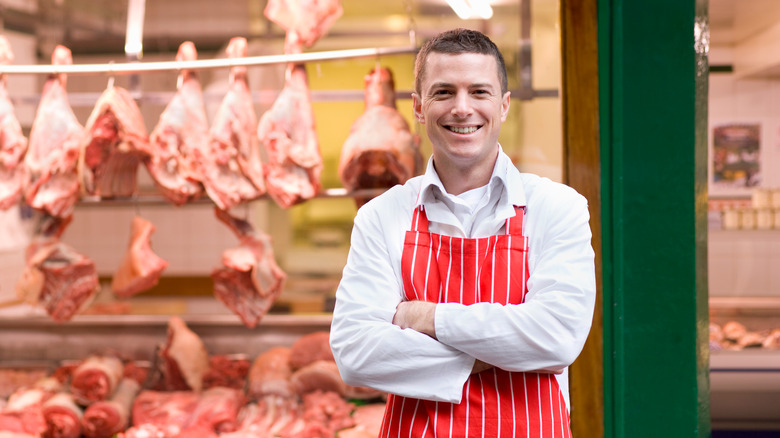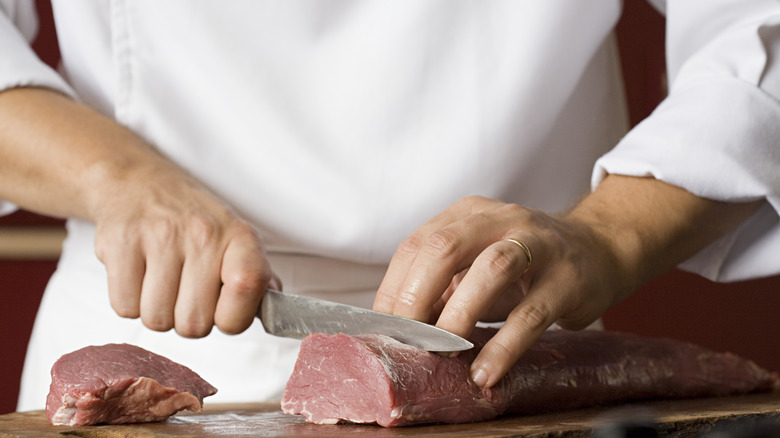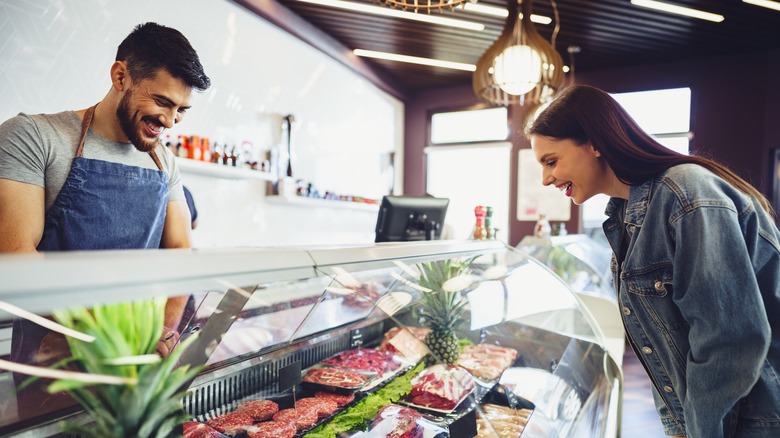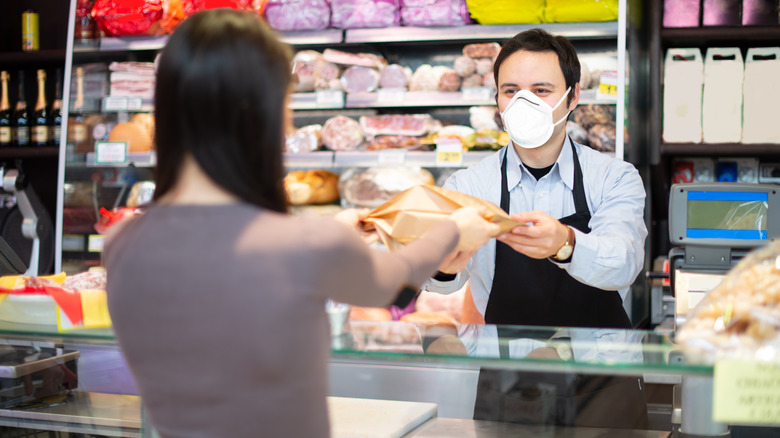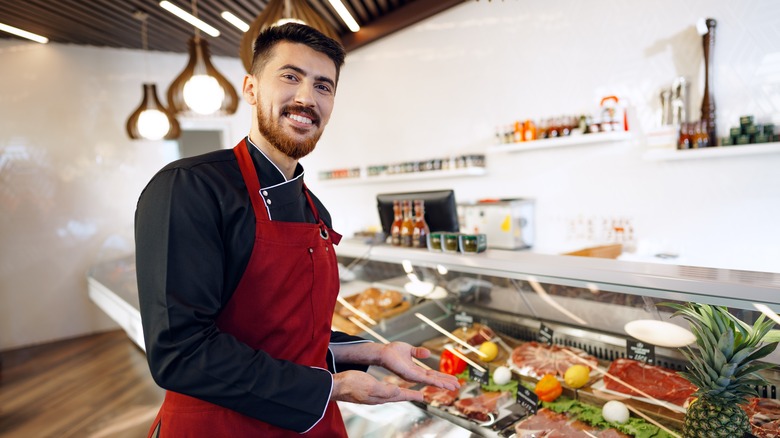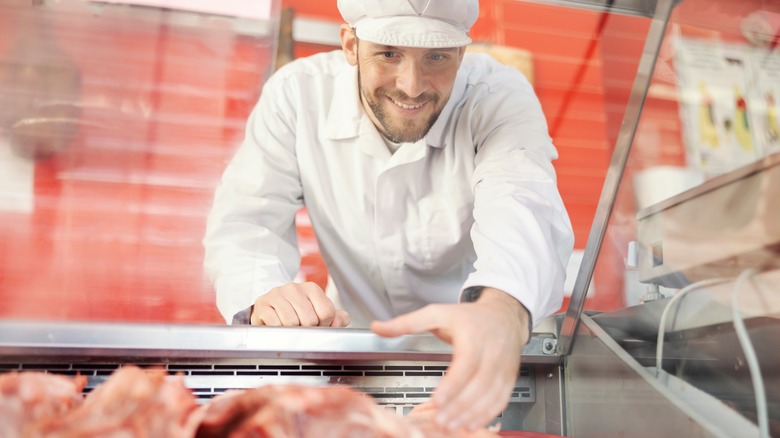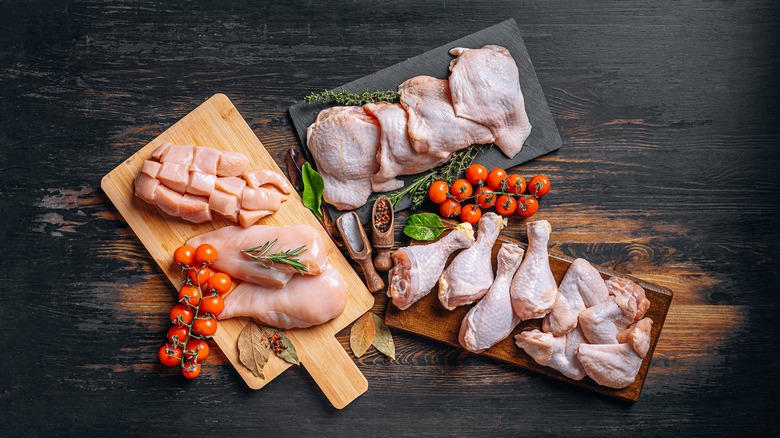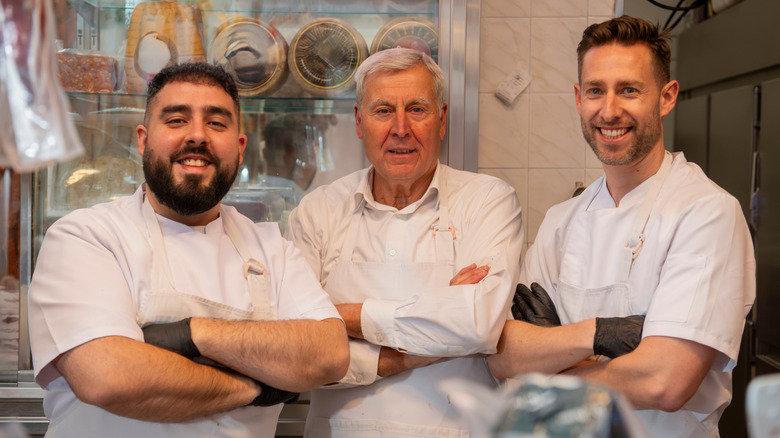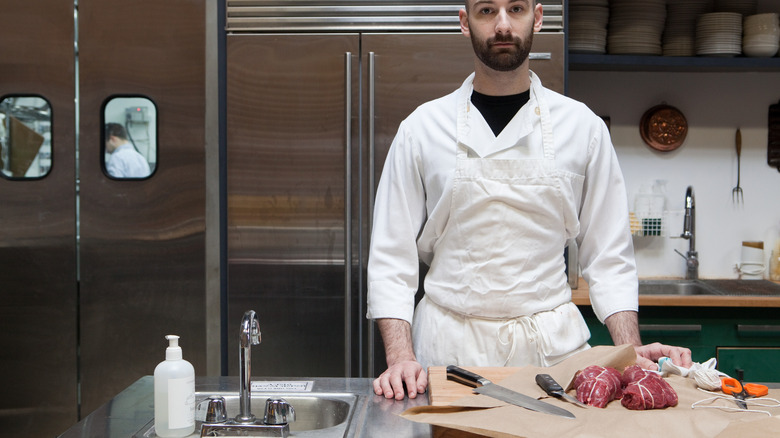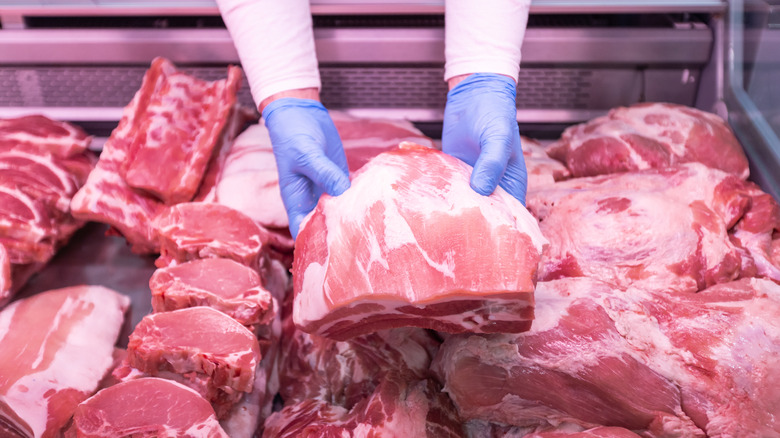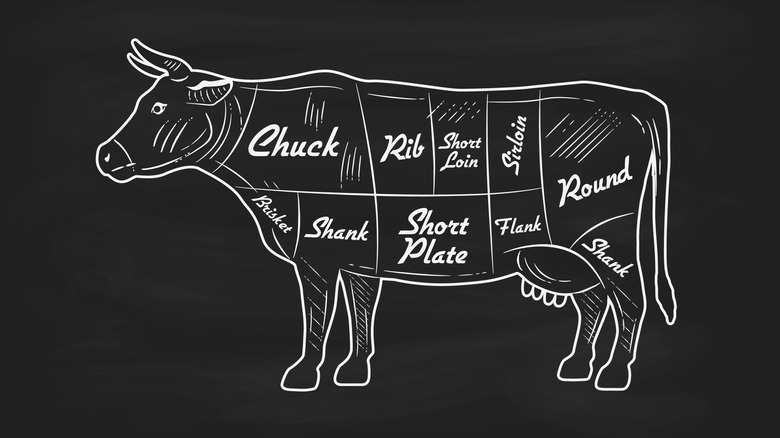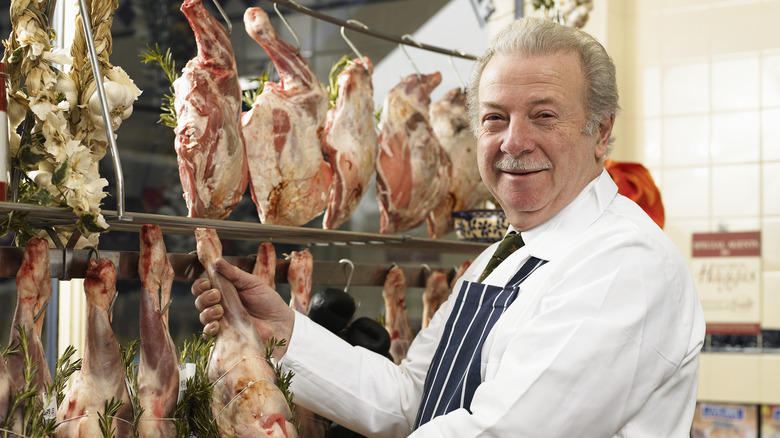11 Tips You Need For Your First Trip To The Butcher
For busy home cooks, buying meat has been a pretty standard matter over the past several decades: Just pick up pre-packaged cuts at the supermarket, where you need to go to get all your other food and household supplies anyway. It's easy to see what you're getting and what you're going to pay, and you can take care of all your weekly shopping in a single trip. Easy peasy.
But while supermarket meat is super-convenient and almost always of acceptable quality, for some serious cooks, the supermarket meat-shopping experience falls short. Perhaps the cut of meat you're looking for isn't available – or the cuts that are there are too big, too small, too fatty, or too lean for your taste. In addition, cooks who are serious about sustainability and the provenance of their food are turning away from industrially farmed supermarket meat. For both these groups, old-fashioned butcher shops are the answer – at a well-run butcher shop, you'll be served by a professional able to prepare meat to your specifications and answer any questions about how it's sourced. If you're curious to try this, have no fear — no secret handshake is needed to access top-level meat. Here's what you need to know before you to the butcher.
1. Research local butchers before choosing one to try
The first question many cooks will have when considering shopping at a butcher shop is "which one?" Depending on where you live, you may have a lot of options, so ask around – talk to friends to get their recommendations or search online for well-reviewed shops. Be wary, however, of recommendations based solely on price. "Beware of specials or prices that are too cheap," advised Gabriel Llaurado, co-founder and CMO of the online meat purveyor Meat N' Bone. "When it comes to proteins you 'cannot cheat price.' If it's cheaper than it should be, there is a reason for it."
You might want to visit several shops before settling on your go-to shop. During your visit, pay close attention to the display cases and the overall condition of the shop. "For me if a butcher's shop smells like cleaning chemicals like bleach that is a huge turn-off," Peter Smit, executive chef of Sago House, Low Tide, and the Underdog Inn in Singapore, told Mashed. "Also, be sure to see how their meat displays look and if there are flies or insects around the meat and if they are clean and tidy." You should also seek out places with responsive service and a good level of expertise. "Make sure you are able to choose your steaks, [and] whoever is helping you should be knowledgeable enough to explain where a particular cut is sourced from," Llaurado said.
2. Go early to avoid crowds
If you're new to the butcher shop experience, the last thing you want is to feel yourself rushed by a throng of carnivorous shoppers waiting for you to make your choices and move on. For a more relaxed shopping experience, plan to visit early in the day – most butcher shops are quieter then, so the butcher can take more time to guide you through your options.
Meat experts recommend shopping early for another reason as well. "I would always try and go in the morning if possible. Generally they have been in since early morning, so you will be able to get the pick of what you are looking for, especially if they are making everything in-house like their charcuterie and sausages, for example," Smit said. On the other hand, going too early – say by waiting by the door for the "Open" sign to light up – can be unproductive. "Try not to go too early in the morning as they may not have had enough time to prepare the display case and you might miss some great offerings," Rodney Freidank, corporate chef at Table 301 in Greenvile, South Carolina, told Mashed. "It might be most crowded on the ride home from work or on a Saturday." As for the best day of the week, Llaurado shares this advice: "Figure out when your butcher gets deliveries; that's the day to go, as the proteins will be most fresh and supply will be high."
3. It's okay to talk about your price restrictions
There are a lot of great reasons to source your meat from a local butcher rather than a supermarket. Among these are better meat quality and selection, more personal service, and more transparency about the provenance of the meat. Conspicuously absent from this list, however, is price – if you've never shopped at a butcher before, your first impression may be sticker shock. "You may be surprised that the pricing is more varied and often higher than the grocery store," Freidank told Mashed. "This should be due to higher quality of product, or simply because the butcher purchases less at a time than the larger chain store."
Butchers, however, know they can't depend solely on meat-loving millionaires to stay in business, so they will be happy to help you find good meat in your price range. It's okay, even encouraged, to be upfront about your budget and ask for the appropriate recommendations. For instance, if you're planning a steak dinner for two and can spend $20, ask the butcher to suggest some options. But while asking for affordable options is fine, haggling is not. "I would say never to argue about why free range/organic is more expensive and why small farms' meat is more expensive than a supermarket – and don't try and bargain with them on the prices," Smit said.
4. Good butchers love answering questions
When shopping at a butcher for the first time, it might seem like a good move to keep a low profile, order what you need, and get out of the way, because what good can come of publicly revealing your ignorance about meat? A lot, as it turns out. Most butchers are passionate about their profession and more than happy to share their expertise. "Ask questions, do not be shy," Llaurado told Mashed. "We butchers love engaged customers. Take your time, develop a relationship with your butcher."
In addition, butchers can offer a lot more expertise than you might think. Besides their skills in cutting and preparing meat, many butchers are also passionate cooks with plenty of practical tips on meat cookery to share. "If you are not used to cooking certain types of meat then your butcher will be a wealth of knowledge for you," Smit said. "They will be able to give you little tips and tricks on the best way to prepare and cook the meat to get what you are looking for. You may even get some unexpected surprise tips for cooking you never knew about."
5. Don't hold up the line
While butchers welcome questions and some can talk about meat all day, they still have businesses to run and other customers to serve besides you. So when you go, read the room. If it's early in the day (always a good time to shop) and you're the only customer there, ask as many questions as you like – you might be pleasantly surprised at what you learn. But if the only time you can pick up the meat you need is on the way home from work, chances are you'll enter the shop and find a long line of people in the same boat. So to stay in everyone's good graces when the butcher is busy, go in prepared. Know what you want, ask for it, and be on your way.
Also, bear in mind that rush hour at the butcher shop may not be the best time to request special service, even if it seems pretty simple to you. "In addition to the actual cutting and processing, there is a sh-tload of cleaning and sanitizing involved in butchery," a poster identifying as a butcher explained on Reddit. "You might ask for something and think 'well it should only take like thirty seconds,' but we have to wash down all our equipment to do a sudden request properly. This also means that something that did take thirty seconds last time might take much longer this time."
6. If you have a cooking method in mind, a good butcher can suggest good cuts
If you've been cooking for a while, you've no doubt figured out that different cuts of meat respond better to different cooking methods – there is a good reason you're unlikely to ever see flash-seared brisket or slow-braised filet mignon on a restaurant menu. But even for experienced home cooks, it's not always easy to keep track of which cuts are best for which dishes, especially the less-common ones.
This is another case where your local butcher can be helpful. A good reason to seek out a butcher shop rather than a supermarket meat counter is when you need advice about the right cut for a dish you have in mind. For example, if you have a recipe calling for a certain cut but it's out of your price range, your butcher can suggest a workable alternative. Ditto if you have one of those vague recipes that just calls for "stew meat." And as an added bonus, some butchers may even offer you cooking tips and recipes of their own.
7. Special orders are okay, but not all will be possible to fulfill
When shopping at a butcher, another good thing to know is there are probably more cuts available than you see on display. "At Meat N' Bone we actually do not have most of our cuts on display in our physical store," Llaurado explained, "but they are viewable with extensive product information on our online store. It would be impossible to display over 400 proteins." This means that if you don't see what you want, there's a good chance it might still be available – so feel free to ask about its availability.
However, if you have a specific cut or preparation in mind for a special event, it's not a great idea to just go to the butcher shop and assume it will be available. If you absolutely must have it by a specific day or time, it's wise to call ahead and give the butcher time to order or custom-cut it for you. Also be aware that certain specialty cuts with niche appeal may be difficult for a small butcher to special order. For instance, if you need just one beef heart, your butcher will probably have to order a whole box of them (and then figure out a way to sell the rest of them). There's no harm in asking, but since this might not be a sustainable option for a small butcher shop, you might have to source more your exotic cuts elsewhere.
8. Lesser-known cuts can be affordable treats
Something new you might encounter when visiting a butcher for the first time is a wider variety of cuts than you see in a supermarket. While a supermarket may have bigger quantities of stuff on display, it's almost all going to be the familiar greatest-hits – after all, that's what sells. But a butcher, like an indie record store owner, will also be an expert in deep cuts. "You should also expect [a] variety of products and access to more proteins and rarer cuts than what you will find at most supermarkets," Llaurado told Mashed.
And best of all for curious cooks looking to expand their cooking repertoire, butchers will advocate passionately for their personal favorites. "Butchers generally have their 'special' cuts that they love," Smit told Mashed. "For example, the hanger steak (also known as the butcher's steak) was for a while a butcher's best-kept secret and they would generally keep it for themselves instead of selling it, but now it has become a commonly known cut. Once you have a good reputation with your butcher, they will generally have some little secret cuts they could share." If this isn't motivation enough to make friends with your local butcher, consider this: many of these lesser-known cuts are not only great eating, but economical. So if you're looking to try something different while saving money, ask nicely. You may be pleasantly surprised.
9. Butchers can do a lot of the prep work for you
If you've been frustrated by prepackaged cuts of meat that are too small, too lean or fatty, or just plain wonky-looking, seeking out a butcher might be a smart alternative. Butcher shops not only offer a wider variety of cuts than supermarkets, but can also custom-prepare cuts to your specifications. So if you want your steaks trimmed of fat or are looking for a slightly different cut from what's on display, your butcher will be able to set you up. And even if you're not sure exactly what kind of cut will best suit your needs, your butcher can still help. "If you do not know what you are looking for, talk about how you plan on cooking (grill, oven, stove, smoker) and talk about your preferences (tender, fatty, lean)," Llaurado said. "Also knowing how many people you are cutting for helps."
In addition, butchers can save you time and labor by doing a lot of the messy (and often tricky) prep work for you. "We're happy to debone it for you, pound it out, butterfly it; whatever you need, it's free," Nicola Ottomanelli, chairman of Ottomanelli's butcher shop in Manhattan, told Woman's Day. And if you ask nicely, your butcher may offer additional services as well, such as tying roasts and hams or slicing meat paper-thin for shabu-shabu (Japanese hot pot).
10. It's helpful to familiarize yourself with common butchering terms
Good butchers love what they do and are more than happy to share their expertise with novices. And they certainly don't expect their customers to know as much as they do. But if you're planning on visiting a butcher shop for the first time and want to shorten your learning curve so you can more quickly take advantage of what's on offer, it'll be helpful to learn some of the basic butchering terminology you might hear once you arrive.
Some of the basic terms you'll see relate to USDA grades for meat, which are determined by quality and the quantity of marbling and fat. Prime is the highest grade with the most marbling – it's also the most expensive. Choice is the next highest grade (and one you're more likely to have encountered already). Select is the leanest of the grades. Other terms refer to specific ways butchers can prepare your meat. "Trimming" means removing excess fat, for example, and "butterflying" means slicing and opening up a thick piece of meat to form a thinner, wider piece.
11. Good butchers value open communication and loyal customers
Independent butchers know they can't compete with supermarkets on price, so they make up for this by focusing on quality and service. And good butchers put special effort into building long-term relationships with their customers. So when you go, don't be shy – the working relationship you build with your butcher will benefit both of you. "It is good to get to know the butcher. As in any hospitality experience, the more the butcher knows you, the better they will become at preparing items to your preference," Freidank said. "When the butcher knows you, they might recommend your favorite meats and cuts when you walk in, or even notify you in advance when they will be getting in something that will make your family excited."
But not even the best butcher gets it right all the time, so principled butchers want to be made aware of any problems you may have had with their service or offerings. It's important for them to keep their longtime customers happy, so don't just walk away and refuse to patronize that butcher again if you have a single bad experience there. Instead, inform them politely of the issue. A good butcher will treat the conversation as a learning experience and an opportunity to win back your trust.
